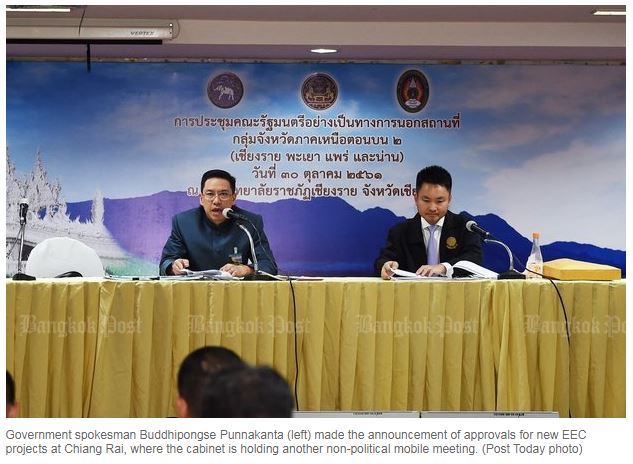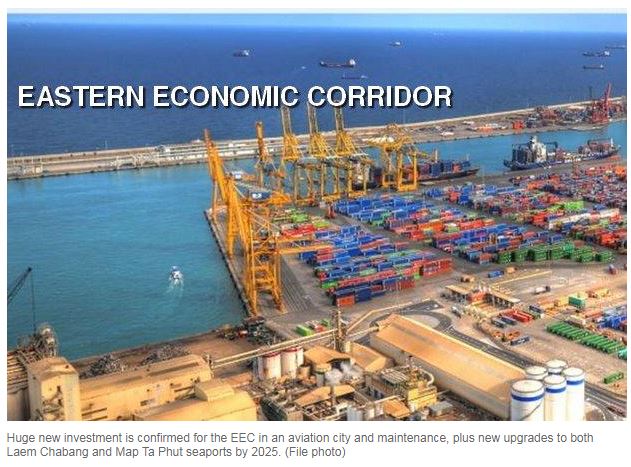Thailand: 4 EEC projects worth B470bn get nod
CHIANG RAI: The cabinet has endorsed four infrastructure investment projects worth a combined 470 billion baht under the government’s flagship Eastern Economic Corridor (EEC) scheme.
The projects were approved by the EEC Policy Committee on Oct 4 and endorsed at a mobile cabinet meeting on Tuesday in the northern province.
The approval came as some of the nation’s economic engines including exports, tourism and industrial production, have shown signs of a slowdown.
Thailand’s exports in September fell 5.2% on-year, fetching US$20.7 billion (687 billion baht). It was the first dip in 19 months.
The number of foreign tourists is expected to drop by 1.5 million this year from an earlier estimate of 39.5 million after Chinese arrivals dropped for a third straight month in September, according to the Fiscal Policy Office.
Last month’s manufacturing production index (MPI) fell 2.6% on-year for the first time in 16 months.
The four EEC projects are: U-Tapao aviation city (290 billion baht), due to operate in 2023; a maintenance, repair and overhaul (MRO) centre (10.6 billion) set to open in 2022; the third phase of Laem Chabang seaport (114 billion) due to open in 2023; and the third phase of Map Ta Phut seaport (55.4 billion) due for launch in 2025.
The projects are all public-private investments. Terms of reference (ToRs) are scheduled to be launched soon and partners will be confirmed by February, the government said at the cabinet meeting.
The aviation city project will be completed in five years, in line with plans to build a high-speed railway linking three airports, including Suvarnabhumi.
The investment includes a third terminal, a commercial gateway, the second phase of an MRO, a cargo village or free trade zone, and a human resource training centre.
The 6,500-rai aviation city will be able to accommodate 60 million passengers annually, putting it on par with Suvarnabhumi. It is expected to yield economic returns worth 189 billion baht.
The third phase of Laem Chabang seaport is likely to generate 180 billion baht while the third phase of Map Ta Phut port is eyeing 85.3 billion baht, according to the government’s statement.
The infrastructure and rail projects are worth 650 billion baht, said government spokesperson Natthaporn Jatusripitak.
He said the four projects are expected to contribute 820 billion baht in benefits to the Thai economy, excluding the impact of 40,000 new jobs and a financial rate of return to the government projected at a combined 559.71 billion baht.
 In a related development Tues, Prime Minister Prayut Chan-o-cha chaired a meeting on social and economic development in the upper North covering Chiang Rai, Phayao, Phrae and Nan.
In a related development Tues, Prime Minister Prayut Chan-o-cha chaired a meeting on social and economic development in the upper North covering Chiang Rai, Phayao, Phrae and Nan.
The meeting was attended by the four provincial governors and representatives of the private and civic sectors.
The meeting discussed measures to boost tourism, trade and investment, infrastructure investment, agriculture, quality of life, and natural resources and the environment in the four northern provinces.
Gen Prayut said the North has the potential for considerable tourism development. He said the government has come up with a strategy to upgrade travel-related services and promote cultural and health-related tourism.
The plan aims to better connect Thailand with neighbouring countries in Asean, the Greater Mekong Subregion, and members of the Bay of Bengal Initiative for the Multi- Sectoral Technical and Economic Cooperation (Bimstec).
Bimstec comprises Bangladesh, Bhutan, India, Myanmar, Nepal, Sri Lanka and Thailand.
The cabinet also approved a proposal by the private sector to promote Tham Luang cave in Mae Sai district of Chiang Rai as a top-tier tourist attraction following the rescue of 13 members of a local football team, the Wild Boars, from June 23 to July 10.
Other approved proposals include further development of Kwan Phayao, the largest freshwater lake in the northern region, and an upgrading of Phayao sports stadium.
Gen Prayut said the government will promote organic farming using insecticides made from natural plants rather than chemicals, and increase areas for organic farming.
The regime also plans to develop the four northern provinces into smart cities for elderly people. Emergency medical services will be provided for those who have accidents, among other planned services, Gen Prayut said.
Addressing the preservation of natural resources and the environment in the upper North, Gen Prayut stressed the need for sustainable and efficient management of water resources.
He described the region as being rich in such resources.
Source: https://www.bangkokpost.com/business/news/1567282/4-eec-projects-worth-b470bn-get-nod


 English
English




